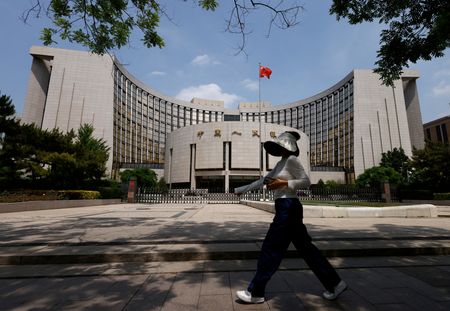By Jihoon Lee
SEOUL (Reuters) -South Korea’s government put forward plans on Thursday to roll back recently imposed tax cuts, such as those on corporate income and stock investments, as the country’s new leader seeks an expansionary fiscal policy to support an economic recovery.
In annual tax code revisions, the finance ministry has proposed raising taxes on corporate income and stock investments, which had been cut by the former conservative administration of Yoon Suk Yeol, who was impeached and removed from office over his failed martial law order.
Liberal President Lee Jae Myung, who took office on June 4, has argued for an expansionary fiscal policy to boost economic growth. His government has already introduced a supplementary government budget of 31.8 trillion won ($23 billion) including a consumer voucher programme offering cash handouts to all citizens to support domestic demand.
“The focus of this year’s tax code revisions is on strengthening the revenue base for fiscal sustainability, while supporting a leap forward as an economic power and stability of people’s livelihoods,” said Vice Finance Minister Lee Hyoung-il.
The government’s tax revenue fell for a second straight year in 2024, dropping by 7.5 trillion won to 336.5 trillion won, after declining 51.9 trillion won in 2023, amid an economic slowdown and tax cuts.
Asia’s fourth-largest economy grew in the second quarter at the fastest pace in more than a year on rebounding consumer spending and a surge in technology exports, but still faces headwinds from slowing global trade amid U.S. President Donald Trump’s sweeping tariffs.
The International Monetary Fund on Tuesday raised its outlook for most advanced and emerging economies this year based on developments around U.S. tariff negotiations, but South Korea was among the exceptions, with its 2025 growth forecast revised down to 0.8% from 1.0%.
Thursday’s proposal is expected to boost tax revenue by 2.6 trillion won in 2026 and 5.6 trillion won in 2027, according to the ministry.
Taxes on corporate income will be raised by 1 percentage point, back to the 2022 level of 10-25%, from the current 9-24%.
Taxes on stock transactions will also be increased back to the 2023 level of 0.2% from the current 0.15%, while the threshold constituting ‘large shareholders’ subject to capital gains taxes will be lowered to 1 billion won of stock holdings from the current 5 billion won.
Dividend income, however, will be separately taxed from other financial income at lower rates, if it is from companies making high payouts, to make the domestic stock market more attractive. Low dividend payouts have often been cited as a factor behind the so-called “Korea discount” – the undervaluation of companies compared with global peers.
Meanwhile, more artificial intelligence technologies will be designated as part of the country’s “national strategic technologies” that are eligible for tax exemptions for investments. Tax cuts will also be introduced to boost investments in the cultural sector, such as “K-dramas”.
The government plans to submit the proposals to parliament, which is controlled by the ruling Democratic Party, by September 3.
($1 = 1,382.5200 won)
(Reporting by Jihoon LeeEditing by Ed Davies)











